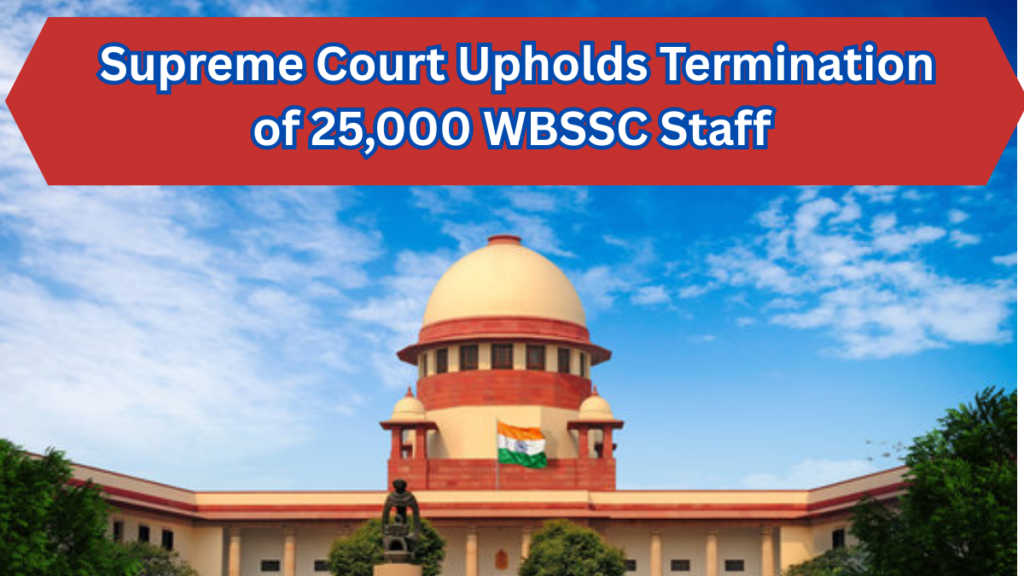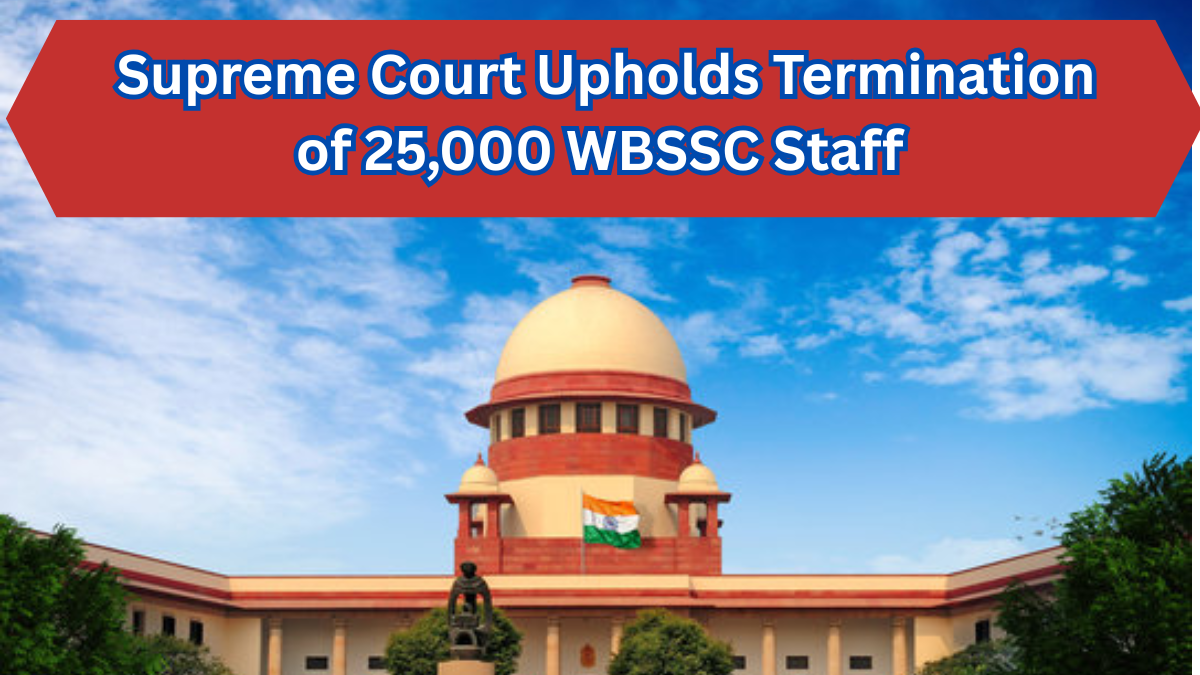The Supreme Court of India has upheld the Calcutta High Court’s verdict terminating the appointments of over 25,000 teaching and non-teaching staff recruited by the West Bengal School Service Commission (WBSSC) in 2016. This ruling comes in response to the infamous school jobs-for-cash scam that has rocked the state, highlighting serious irregularities in the hiring process.

Key Highlights of the Verdict
- The Supreme Court bench, comprising Chief Justice of India Sanjiv Khanna and Justice PV Sanjay Kumar, upheld the High Court’s decision, citing fraudulent practices in the recruitment process.
- The court ruled that these appointments amounted to cheating and must be terminated immediately.
- However, the judges clarified that affected candidates will not be required to return the salaries received so far.
- The verdict has serious implications for the education sector in West Bengal, raising concerns over transparency and accountability in recruitment processes.
Background: The School Jobs-for-Cash Scam
The scam revolves around alleged illegal recruitments in primary and secondary schools across West Bengal during the 2016 hiring process. Investigations revealed massive irregularities, including:
- Tampering of OMR sheets – Several candidates’ answer sheets were manipulated to give them undeserved higher rankings.
- Manipulation of candidate rankings – Some applicants who were initially ranked lower were pushed up to secure job positions.
- Issuance of appointment letters exceeding available vacancies – A total of 25,753 candidates were appointed, even though only 24,640 posts were officially available.
- Appointments granted despite blank OMR sheets – Some candidates allegedly received job offers even though their answer sheets were left completely blank.
High Court’s Findings and Directives
The Calcutta High Court found severe discrepancies in the WBSSC recruitment process and, as a result, ordered the termination of 25,753 appointments in state-run and state-aided schools. The court’s key observations included:
| Irregularities Identified | Action Taken by High Court |
|---|---|
| Appointments made beyond vacancies | Canceled and declared void |
| Recruitment despite blank OMR sheets | Annulled and declared fraudulent |
| Jobs awarded after recruitment deadline | Terminated immediately |
| Rank manipulation in the selection process | Declared unlawful and revoked |
The High Court further directed that candidates who secured jobs fraudulently must return all salaries and benefits received, along with 12% interest.
Supreme Court’s Stance
In its ruling, the Supreme Court refused to overturn the High Court’s decision, emphasizing that the selection process was fraudulent. The key takeaways from the ruling include:
- Candidates who secured jobs illegally must be removed.
- Those who received salaries and benefits unlawfully must return them with 12% interest.
- The CBI investigation into the scam will continue as per the court’s directive.
While the Supreme Court provided relief by ruling that salaries need not be returned in some cases, it firmly stood by the decision that fraudulent appointments should be terminated.
How the Case Reached the Supreme Court?
- The Calcutta High Court’s ruling had originally nullified the appointments in May 2023.
- On May 7, 2023, the Supreme Court put a temporary hold on the High Court’s verdict but allowed the CBI probe to continue.
- Over 126 appeals, including one from the West Bengal government, were filed in the Supreme Court against the High Court’s ruling.
- The Supreme Court’s final decision now confirms that the High Court’s findings were justified and that no interference was needed.
Political and Legal Repercussions
The scandal has led to the arrest of several high-profile figures, including:
| Name | Position | Involvement |
| Partha Chatterjee | Former West Bengal Education Minister | Allegedly played a central role in the scam |
| Manik Bhattacharya | Trinamool Congress (TMC) MLA | Accused of manipulating recruitment processes |
| Jiban Krishna Saha | Trinamool Congress (TMC) MLA | Arrested for alleged involvement in the fraudulent hiring |
These arrests have intensified political debates in the state, with opposition parties calling for greater transparency in recruitment procedures and questioning the credibility of the ruling Trinamool Congress (TMC) government.
Implications for West Bengal’s Education System
The verdict has raised multiple concerns:
- Job insecurity for thousands of affected employees – Many individuals who secured jobs through this recruitment process now face termination.
- Potential disruption in the education sector – The removal of thousands of teachers and non-teaching staff could impact school operations.
- Reform in recruitment processes – The ruling underscores the need for transparency and accountability in government hiring procedures.
- Increased scrutiny of future recruitment drives – The government may introduce stricter verification measures to prevent similar scams in the future.
FAQs
1. What was the main reason behind the Supreme Court’s ruling?
The court found massive irregularities in the 2016 recruitment process, including tampered OMR sheets, rank manipulation, and appointments exceeding available vacancies. These fraudulent practices rendered the entire recruitment process invalid.
2. Will the affected candidates have to return their salaries?
No, the Supreme Court ruled that while their appointments are being annulled, candidates do not have to return salaries already received. However, those found to have received benefits fraudulently may be required to pay them back with 12% interest.
3. Who are the key figures involved in the scam?
Several high-profile figures, including former Education Minister Partha Chatterjee and TMC MLAs Manik Bhattacharya and Jiban Krishna Saha, have been arrested for their alleged roles in orchestrating the scam.
4. How does this verdict affect future government recruitments?
The ruling underscores the need for merit-based hiring and strict oversight in recruitment processes. It sets a legal precedent that fraudulent government job appointments will not be tolerated, ensuring greater accountability in public-sector hiring.
The Supreme Court’s decision serves as a crucial reminder that fraudulent recruitment practices will not be tolerated, reinforcing the importance of fair and transparent hiring in government jobs. The ruling also highlights the need for strict verification processes and independent audits to prevent similar scams in the future.
Click here to learn more
Sachin is a dedicated writer specializing in education, career, and recruitment topics, delivering clear and actionable insights to empower readers.
